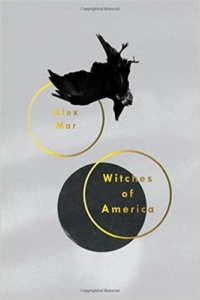About a quarter of the way through Witches of America, Alex Mar’s survey-of-slash-immersion-in various strains of American witchcraft, the author finds herself at a weeklong, outdoor festival: the Pagan Spirit Gathering in Illinois. The scene at PSG is on the crunchy end of the witchcraft spectrum — attendees don Crocs and sarongs; campsites are organized by “clan”; Mar witnesses an ancient Celtic “handfasting,” or marriage ceremony — and, despite the clothing-optional policy, markedly wholesome. “If going skyclad,” the organizers advise, using the Pagan term for nudity, “use sunscreen to protect all your skin from the sun.”
At PSG, Mar participates in Dianic — feminist — Wiccan rituals: two hundred women, “maidens,” “mothers,” and “crones,” all chanting, “My body is the body of the Goddess!” and “Justice for our sisters!” There is, as Mar notes, more than a whiff of second-wave feminism about the worship of Diana, she “who uses her ‘sacred uterine bloods’ to create the world”; about the high priestess who implores the women assembled to “put your hands on your womb. This is the center of your power!”; about the exclusion of men. (The connections are not mere coincidence; the first feminist witches’ coven, Susan B. Anthony Coven No. 1, was founded in 1971.) And this, Mar concedes, makes her slightly uncomfortable. “I can’t relate,” she admits. “I feel embarrassed.”
But Mar’s uneasiness runs deeper than her knee-jerk rejection of the “dated, pro-women” gatherings she encounters at PSG — a rejection for which I cannot fault her (while I admire Dianic Wicca’s inclusive intentions, its emphasis on bringing women of all ages together in cooperation rather than competition, the idea of using the word “sister” in any but the most literal sense makes me cringe). What she finds more fundamentally unappealing is the friendly, Midwestern vibe at this low-stakes, all-comers-welcome “Pagan Woodstock.” “I want,” she writes, “access to the level of witchcraft that only time and training and trust can earn.” PSG is the Christmas Eve Mass of witchcraft, popular and undemanding; Mar is looking for the Pagan equivalent of a hair shirt.
***
The appeal of faith — and I am not, I should say, religious — is, to my mind, twofold. There is, most obviously, the reassurance that systems of religious belief offer: that, for example, God loves you; that if you follow His commandments you will go to heaven; that if you sin and repent of your sin, you will be forgiven. A desire to know the source of this reassurance — this certainty — is half of what drives Mar, a documentarian whose initial goal is to shoot a feature-length film about American mysticism, to “circle” with covens from coast to coast. (Most of the groups Mar spends time with are vaguely related to or in the tradition of Wicca, which exists in its current form thanks largely to the British naturist Gerald Gardner — though she does also visit a few graveyards with a necromancer.) Mar, curious, generous, but hardly credulous (she describes herself as “an overeducated liberal, a feminist, a skeptic long suspicious of organized religion”) wants to know “what it’s like to believe, without doubt, that you hold the key to the Mysteries, that you are capable of magic.”
But faith is also an organizing principle, both in that it provides ready answers to moral quandaries, and in a plainly literal sense: a faith may dictate what you can eat and when you can eat it, may ask you to pray at certain times, may require the adoption of specific clothing and the abandonment of modern conveniences.
In this one small way, then, faith can function practically in one’s life the way a diet, or an exercise regimen, or even a monogamous relationship might, by eliminating the need to make decisions on a case-by-case basis. “Religion,” as Mar writes, “maps onto chaos and humans crave sense and meaning. So, in the absence of a religious system . . . we seek out a substitute, other rules by which to map our behavior.” As the Hasidic Jew does not imagine hopping in a car on a Saturday afternoon just this once, the vegetarian out to dinner does not wonder if she should get the steak; the marathon runner does not accept brunch invitations because she’s blocked out the hours between 11 am and 2 pm on Saturday for training; the married woman’s finger does not hover over the screen of her phone as she tries to figure out whether to swipe left or right. Or at least this is the idea — the ideal.
Mar leaves PSG believing that what she is looking for is “deeper, darker, more layered, harder to live with,” than what the Dianic rituals she has participated in can offer (and worrying that this betrays “evidence of damage to my own psyche”). But perhaps the desire is not for something darker, but simply for something more demanding — something that will force her life to take a particular shape. “Now solidly in my thirties,” Mar reflects, “I spend increasing amounts of effort piecing together my narrative, explaining my past behaviors to myself as chapters along the way to the protagonist I’ve become.” To submit to the rigors of a particularly strict branch of Paganism would mean an end to at least some of that effort, for it would mean an end to that process of becoming; there would be just one, last protagonist, standing at the end of Mar’s narrative, to explain.
***
Not long after her disappointing experience in Illinois, Mar decides to begin training with a Feri teacher named Karina. Feris follow the teachings of the American Victor Anderson, who, in 1926, as a nine-year-old boy, stumbled across a naked witch sitting in the center of a circle in the woods of Bend, Oregon. Anderson took off his clothes as well, entered the circle, and was initiated by the witch “sexually and magically.” It is one clan among many in the modern Pagan movement and, as its foundational narrative might suggest, it has a “reputation for being especially intense.” This is, for Mar, certainly a part of the allure; she is, she writes to Karina in an introductory email, “drawn inexplicably to what I perceive to be a darkness” at Feri’s core.
Mar’s description of her training, however, is filled not with dark mysteries but with quotidian rituals the author finds herself, unexpectedly, rebelling against. She is supposed to begin every day with an “invocation of the Star Goddess,” but morning after morning she delays, promising herself she will pray — but later; first she has to send a few emails, or shower, or a buy an appropriately fancy priestly robe. Uncertain as she is — she worries she is losing her “sense of self” — Mar presses on. She rubs her body with unbroken eggs, wears an evil eye bead inside her shirt, researches various goddesses, trying to find the one with whom she can form a deeper connection. Six months into her training, she spends three nights in a castle in the woods of New Hampshire with her covenmates for Samhain, the sabbat we celebrate in bastardized form as Halloween.
But wanting is not the same as — is sometimes more satisfying than — having, and Mar’s attempts to unquestioningly immerse herself in the rigors of training flounder. “To have a legitimate, unpretended connection to God or Goddess or an entire army of godlike forms,” she muses as she confronts her resistance to Feri rituals, “to have sincere religious beliefs at all — you have to connect on a level that is more than intellectual.” This is what, ultimately, she cannot do. Mar and Karina “break up, over the phone.”
Mar’s experience did not disabuse me of the notion that words and rituals have a performative power in and of themselves, but it did remind me that this power does not accrue automatically. One must already, at the very least, believe that repetition, that language, have a kind of force. Wedding vows themselves don’t prevent infidelity; but believing in them might.
***
I mention wedding vows because marriage is one of the most common ways in which humans voluntarily bind themselves; over two million Americans every year promise to love and honor their partners, forsaking all others — a promise it is statistically improbable most will keep. Of these more than two million, I doubt many thrill to the loss of freedom that marriage necessarily entails; those that consider the personal liberties about to be curtailed, likely do so with a feeling not of relief, but of regret.
I mention wedding vows also because I recently got married. And if the desire to have my own, individual will bow before needs dictated by partnership is not the reason I swore an oath aloud before a justice of the peace — I decided to get married for the usual reason: love — I am also glad, as dully practical as I know this sounds, to have certain romantic questions settled. If all goes well, I will never again kiss someone for the first time; but I will also never again have to decide whether a first date merits a second, whether a relationship is worth fighting for or should be abandoned. And if I yield not to the mysteries of a holy text, but to the till-death-do-us-part promise of marriage, it is the same logic of submission that courses beneath.
All of which made Mar’s desire to find the set of rituals to which she can happily give herself over exceptionally resonant, and her inability to fulfill this desire — or, perhaps, her inability to find satisfaction in this fulfillment — personally troubling.
***
If Mar cannot give herself over to ritual long-term, she still longs for the kind of freedom that comes with freedom’s partial loss. And so, her apprenticeship with Karina at an end, She turns to the Ordo Templi Orientis (OTO), whose outpost in New Orleans, the Alombrados Oasis, Mar has already visited.
The OTO, founded by German Masons in the first decade of the twentieth century and led for decades by the Englishman Alastair Crowley, is an occult sect whose adherents follow Thelemic law — “Thelema” comes from the Greek word for the will — which teaches that “sin is a lie, and sex is a mystical union that can be used for strong magic.” Their rites are symbolic in the extreme. As Mar writes of the Gnostic Mass she participates in at Alombrados — which involves chanting, incense, a sword, yards of a brocade, and a naked priestess — “no aesthetic gesture is empty; everything is loaded, overloaded, buckling under with meaning.” If Mar is not, after that first mass, convinced that “There is no part of me that is not of the gods” — as congregants, she included, announce after they ingest the sacrament — she is, nevertheless, entranced; “this is,” she remarks of the mass, “great theater.”
Mar decides to take her Minerval, a kind of “starter initiation”: four days alone in a Louisiana swamp with two other initiates. It’s the rainy season, and Mar is advised to buy a pair of waterproof boots from the company that manufactured shoes for American soldiers during the Vietnam War. Her first night in the tent passes slowly: “I feel the sweat settling deep into my pores,” she writes, “and the tree roots settling deep into my back. Every hour, every half-hour, will drag itself out painfully.” The bugs, the heat, the damp, the forced marches — these begin as irritants, but end by overwhelming Mar; in a good way. She goes into the swamp hoping that precisely by relinquishing control she will not only learn “something radical and new,” but also, paradoxically, “just maybe, become freer.” By the time she is tackled to the ground — in the last stage of the rite, members of Alombrados more or less kidnap the initiates and drag them off to a feast — she has been, willingly, conquered. “Face down in the dirt, I submit — completely.”
Mar’s account — throughout Witches of America, but in this scene in particular — can make the reader wince, not because her desires (to surrender; to belong; to believe and therefore know), which she expresses at once baldly and eloquently, are unique, but precisely because they are not. We speak derisively of being slaves to routine, but if all obligations were eliminated, if we were confronted by complete freedom of choice, who among us could honestly say that she would not be paralyzed? Mar’s desire to discover a principle around which to organize her life is revealed to be greater than her appetite to live a life so organized. But the appeal of temporary submission — the hours in the swamp, the seconds she spends cheek to earth, her own will negated by the weight of another body, pressing down against her own — remains. In those moments Mar is able to forget herself. One can imagine fear at such a moment, but I prefer to imagine relief.
Miranda Popkey is the assistant to the editor at Harper’s Magazine. She has been published in, among other venues, The Paris Review Daily, The New York Observer, and The Oyster Review.
This post may contain affiliate links.








